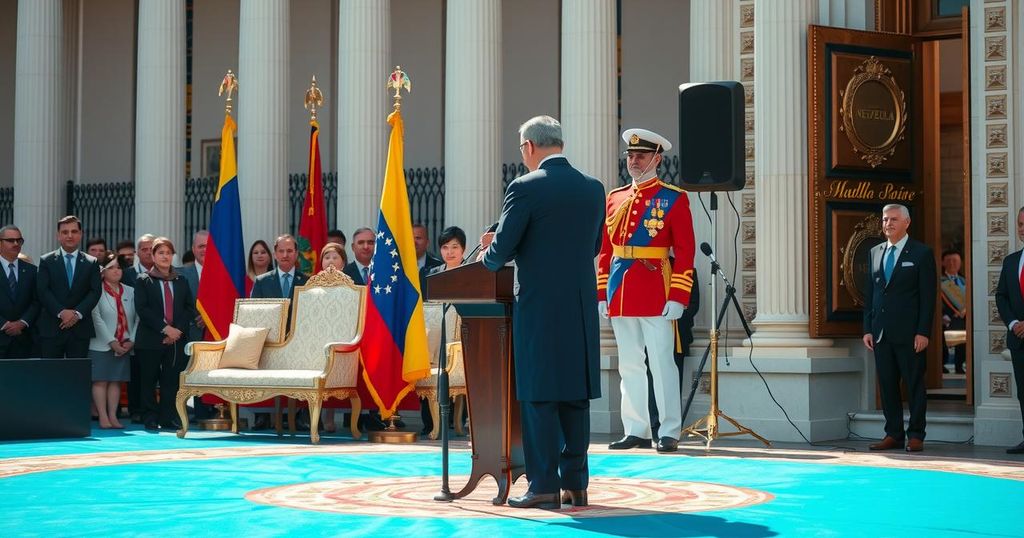Maduro’s Inauguration Amid Controversy in Venezuela

Nicolás Maduro is set to be inaugurated as president of Venezuela today despite lacking formal electoral validation. Opposition candidate Edmundo González claims he will return to assume the presidency, having amassed evidence of his victory. The tension in the streets reflects the ongoing political crisis as dissent and governmental repression come to a head on what should be a significant day for Venezuelan politics.
Nicolás Maduro is set to be inaugurated as the president of Venezuela today, January 10, amid significant controversy surrounding the legitimacy of his electoral victory. Despite the absence of formal electoral records and significant international scrutiny, Maduro will proceed with the ceremony largely unaccompanied by foreign dignitaries. Opposition figure Edmundo González has publicly declared his intention to return to Venezuela and assume the presidency, claiming to have evidence of his own electoral win. González, who amassed substantial evidence of his victory validated by international observers, plans to enter the country soon, bolstered by the support of the Venezuelan opposition.
In the lead-up to the inauguration, the atmosphere has been tense. Maduro’s government has intensified its crackdown on dissent, leading to arrests of activists and opposition leaders, contributing to fears of escalating violence. The political landscape remains precarious, as Edmundo González continues to vocalize his readiness to confront the current regime despite the risks involved. His recent travels across the Americas have fueled speculation about his potential return and the possibility of a national dialogue moving forward.
Amid these developments, several foreign ambassadors are anticipated to attend the ceremonial swearing-in, although most do not recognize the legitimacy of Maduro’s presidency. The presence of representatives from countries that have historically aimed to mediate in Venezuela’s ongoing political crisis serves to highlight the international complexities surrounding this event. Furthermore, tensions have erupted on the streets of Caracas between opposition supporters and Chavistas, signaling significant unrest as the nation grapples with its uncertain future.
The day before the inauguration witnessed confrontations between rival factions, as María Corina Machado, a prominent opposition leader, made a comeback after months in hiding, emphasizing the need for unity and resilience among her supporters. The political turmoil continues as citizens anxiously await developments that could reshape the direction of governance in Venezuela.
As Maduro prepares to don the presidential sash, the narrative shifts sharply towards González, whose hypothetical ascent to power represents a flicker of hope for many Venezuelans longing for change. The unfolding events reflect the deep divisions within Venezuelan society and the continued struggle for democratic representation.
The political climate in Venezuela has long been fraught with tension, particularly following a controversial electoral process. Nicolás Maduro’s government, which has faced accusations of authoritarianism and electoral fraud, continues to maintain power despite domestic and international opposition. The situation is further complicated by the presence of prominent opposition leaders who have gathered evidence challenging the legitimacy of Maduro’s administration. The country has experienced heightened political repression, leading to a climate of fear and uncertainty among voters and activists alike.
In conclusion, Nicolás Maduro’s inauguration marks a controversial chapter in Venezuela’s political saga, fraught with allegations of fraud and repression. The determination of Edmundo González and other opposition figures to contest Maduro’s legitimacy highlights a deeply divided nation. As tensions escalate, the future of Venezuela’s governance remains uncertain, with international attention focused sharply on the ongoing conflict between the competing claims to leadership and the potential for both unrest and change in the country.
Original Source: english.elpais.com








